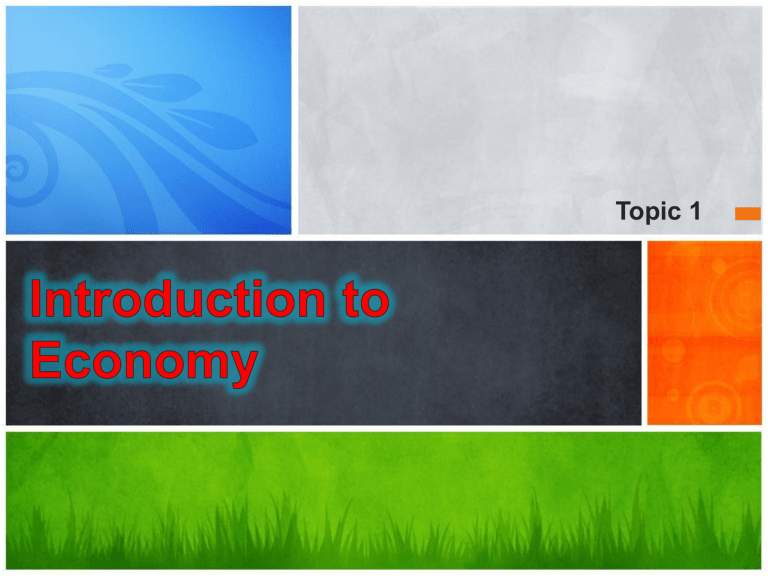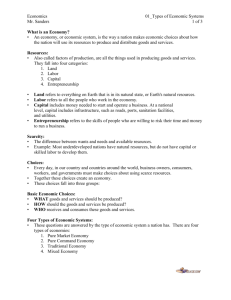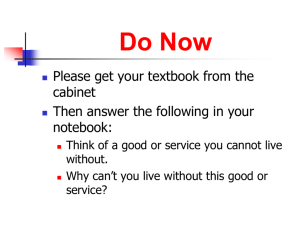
Topic 1 The Basics WHAT IS ECONOMICS??? • Economics – the study of how individuals and societies make decisions about ways to use scarce resources to fulfill wants and needs. The Study of Economics • Macroeconomics – The big picture: growth, employment, etc. – Choices made by large groups (like countries) • Microeconomics – How do individuals make economic decisions ECONOMICS: 5 Economic Questions Society (we) must figure out • WHAT to produce (make) • HOW MUCH to produce (quantity) • HOW to Produce it (manufacture) • FOR WHOM to Produce (who gets what) • WHO gets to make these decisions? What are resources? • Definition: The things used to make other goods BUT, there’s a Fundamental Problem: SCARCITY: unlimited wants and needs but limited resources Choices, Choices • Because ALL resources, goods, and services are limited – WE MUST MAKE CHOICES!!!! Why Choices? We make choices about how we spend our money, time, and energy so we can fulfill our NEEDS and WANTS. What are NEEDS and WANTS? Wants and Needs, Needs and Wants • NEEDS – “stuff” we must have to survive, generally: food, shelter, clothing • WANTS – “stuff” we would really like to have (Fancy food, shelter, clothing, big screen TVs, jewelry, conveniences . . . Also known as LUXURIES VS. TRADE-OFFS You can’t have it all (SCARCITY – remember?) so you have to choose how to spend your money, time, and energy. These decisions involve picking one thing over all the other possibilities – a TRADE-OFF! Trade-Offs, cont. • IN YOUR JOURNAL: What COULD you have done instead of come to school today? • These are all Trade-Offs! Thanks for being here! A special kind of Trade-Off is an OPPORTUNITY COST = The Value of the Next Best Choice (Ex: Sleeping is the opportunity cost of studying for a test) Production • So how do we get all this “stuff” that we have to decide about? Decisions, decisions … PRODUCTION, cont. • Production is how much stuff an individual, business, country, even the WORLD makes. • But what is “STUFF”? • STUFF – Goods and Services. • Goods – tangible (you can touch it) products we can buy • Services – work that is performed for others Factors of Production • So, what do we need to make all of this Stuff? 4 Factors of Production • LAND – Natural Resources – Water, natural gas, oil, trees (all the stuff we find on, in, and under the land) • LABOR – Physical and Intellectual – Labor is manpower • CAPITAL - Tools, Machinery, Factories – The things we use to make things – Human capital is brainpower, ideas, innovation • ENTREPRENEURSHIP – Investment $$$ – Investing time, natural resources, labor and capital are all risks associated with production Which Factor of Production? Which Factor of Production? Which Factor of Production? Which Factor of production? THREE parts to the Production Process • Factors of Production – what we need to make goods and services • Producer – company that makes goods and/or delivers services • Consumer – people who buy goods and services (formerly known as “stuff”) Which Came First? Production Process Land Goods Labor Production/Manufacturing “Factory” Consumers Capital Services Entrepreneurship Capital Goods and Consumer Goods • Capital Goods: are used to make other goods • Consumer Goods: final products that are purchased directly by the consumer CHANGES IN PRODUCTION • Specialization – dividing up production so that Goods are produced efficiently McDonald’s makes hamburgers, not shoes!! Nike makes shoes, not hamburgers CHANGES IN PRODUCTION • Division of Labor – different people perform different jobs to achieve greater efficiency (assembly line). You do your job, and I will do my Job and we will be more EFFICIENT CHANGES IN PRODUCTION • Consumption – how much we buy (Consumer Sovereignty) The DELL store is empty because…. Everyone is at the APPLE STORE!!! CHANGES IN PRODUCTION • If we INCREASE land, labor, capital we INCREASE production – Many entrepreneurs invest profit back into production • If we DECREASE land, labor, capital we DECREASE production • BUT WHY would we ever DECREASE production? PRODUCTION, cont. again • A measure of the production of an entire country in one year is GDP The total value of ALL final Goods and Services produced in a country in a year. (GROSS DOMESTIC PRODUCT) Comparative Economics Traditional Economies • Def: Economic Questions answered by custom • Predominately Agricultural • Developing or “3rd World” • Trade and barter oriented • Low GDP & PCI (per capita income = avg. inc.) Command Economies • Def: Economic questions answered by the government • Very little economic choice • No private ownership • Communism • Old Soviet Union, old Communist China, Cuba and North Korea Karl Marx • 19th century German economist • Author of “Communist Manifesto” and “ Das Kapital” – Government should control economy and distribute goods and services to the people • Founder of revolutionary socialism and communism Communism Falls • Market reforms in China in the mid 1970s. • Fall of the Berlin Wall in 1989. • Collapse of the Soviet Union 1991. • Free Market Capitalism (w/ some Mixed Economies) the only show in town. Free Market (Capitalist) Economies • Economic questions answered by producers and consumers • Limited government involvement • Private property rights • Wide variety of choices and products • U.S., Japan Adam Smith • 18th century Scottish economist • Published “The Wealth of Nations” in 1776 • Explained the workings of the free market within capitalist economies • Invisible hand of the market Adam Smith (cont.) • Laissez-faire - Government stays out of business practices “hands off” to let the market place determine production, consumption and distribution. • Individual freedom and choice emphasized. Principles of Capitalism • Competition – more businesses means lower prices and higher quality products for consumers (US!) to buy. Principles of Capitalism • Voluntary Exchange – businesses and consumers MUST be free to buy or sell what and when they want. Principles of Capitalism Private Property – Individuals and businesses MUST be able to get the benefits of owning their OWN property. Government doesn’t control it. Principles of Capitalism • Consumer Sovereignty – consumers get to make free choices about what to buy and this helps drive production (Demand drives Supply). Principles of Capitalism • Profit Motive – people want to make or save $$$$. Their “Self Interest” motivates Capitalism. Mixed Economy/Socialism • Government involvement and ownership and control of property, of decision making, and companies. • Government control of business • Social “safety net” for people • Socialism • Common in Europe, Latin America, and Africa John Maynard Keynes • The Invisible Hand doesn’t always work. • “The long run is a misleading guide to current affairs. In the long run we are all dead.” or . . . the trouble is people eat in the short run. Keynesian Economics (cont.) • Government should intervene in economic emergencies through tax and spending (Fiscal Policy) and changing the money supply (Monetary Policy). • This is done to smooth out the business cycle (expansion and recession) and keep inflation low. Any Question?






